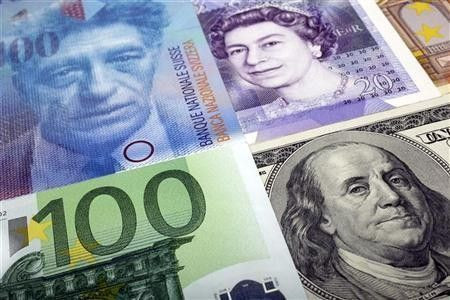QE3 Reviving Fears Of Global Currency Wars

The Federal Reserve's announcement this week that it will launch a third round of open-ended bond-buying to perk up the U.S. economy got a resoundingly positive reception in foreign financial markets on Friday, with the Global Dow, a 150-stock index of corporations from around the world, up 1.65 percent.
But market watchers were expecting the global equity party would lead to an inevitable hangover soon, in the form of intervention by central banks around the world, to stop massive inflows of dollars into non-U.S. economies.
It's a script that's been acted out before. In 2010, when the Fed launched the last round of unsterilized bond buying -- which results in large-scale money printing -- investors massively piled into what's colloquially known as the "carry trade," converting their dollars to foreign cash, investing that money in high-yielding foreign bonds and then re-converting their proceeds back into the dollars.
As long as the returns on their fixed-income instruments exceed any depreciation seen in their foreign currency holdings, the move is profitable and relatively safe.
But, since it also has a side effect of strengthening foreign currencies against the dollar, it can artificially inflate the cost of exports from non-U.S. economies, thus reducing demand for those exports and revenue for exporting countries. The result can be a contest among nations to cut the value of their currencies so as not to be handicapped by one currency's declining value.
The last time that happened Brazilian Finance Minister Guido Mantega characterized it as a "currency war."
He is not the only financial official concerned about the effect of more Fed bond buying.
"Even though we expect the net impact of QE3 on Latin American economies to be positive, it could bring some problems to policy makers in the region. Countries already concerned with the appreciation of their currency, with the excessive expansion of local credit markets or with the excessive dynamism of their housing markets could react to the announcement of QE3 by the Fed," Latin America-focused economists at Spanish bank BBVA wrote in a note Friday. "The announcement of more measures to slowdown capital inflows and protect local industry in a "currency war" environment should not be ruled out, especially in Brazil, Peru and Colombia."
Brazil was already shaping up to form a first line of defense for the situation, with the Financial Times quoting Mantega as saying after the Fed announcement that "we won't let the real (Brazil's currency) appreciate because of these measures."
According to the Wall Street Journal, South Korea, Australia and New Zealand could also see some of the brunt impact.
Not everyone was expecting an unavoidable crisis however.
According to Reuters, investors believed countries had already set themselves up to prevent a re-run of 2010, and would likely nip the situation in the bud this time.
"The immediate gut reaction will be for currencies to strengthen but we'll probably see less of the QE spilling to emerging markets than last time," the newswire quoted Kieran Curtis, a bond fund manager at Aviva, as saying.
There was also the fact that "investors are slightly less comfortable with emerging currencies now than they were" a few years back, Curtis noted.
© Copyright IBTimes 2024. All rights reserved.





















